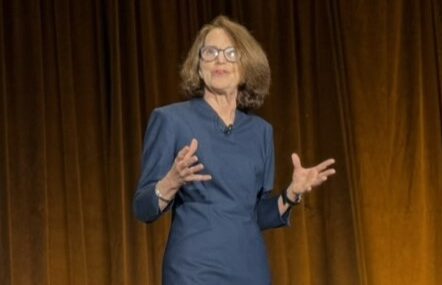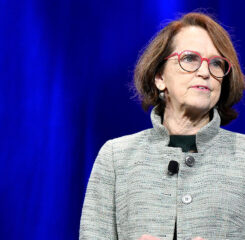“The world is shifting under our feet … whether it’s new expectations from those we serve, new demands on governance and Board effectiveness, the outsized role of technology, or the many dimensions of workforce, just when you think you have it all figured out, new factors emerge and new pressures mount.”
With those words, LeadingAge President and CEO Katie Smith Sloan opened the 2024 LeadingAge Leadership Summit on April 15 by talking about bold change: its importance and the need for our field to commit to it or be left behind.
Sloan challenged members to go beyond “infinite incrementalism,” suggesting instead that “changing to be a little bit better may simply expose us to even greater challenges.” Instead, she said, “We need to think exponentially—not simply incrementally. Think about risk as a strategy—not just something to avoid or to manage.” Noting studies showing widespread dissatisfaction among executives about their own organizations’ level of innovation, she suggested it is time for aging services providers to be asking hard questions about driving innovation:
How can providers rethink their use of technology and make it not only a strategic driver of how they work and provide greater value, but also figure out how to use it as a disrupter: “What is the Uber, AirBnB, or Netflix equivalent in our field?”
How can aging services redesign the field’s existing models and create a fundamentally different approach that serves the rapidly growing middle market?
How can our field embrace a changing consumer mindset about retirement? Consider the trend among people buying their “forever homes” while still in their 50s—and expecting to age in place in them. She asked, “If the consumer is settling into their home in the community ‘forever,’ how do we organize a fragmented marketplace to provide the services and supports they need or want?”
Sloan welcomed the hundreds of Leadership Summit attendees and encouraged them to learn and connect with each other at the Summit, and celebrated the fact that at least two-thirds of them would also use this opportunity to advocate directly with lawmakers by visiting Capitol Hill on Lobby Day, April 19.
“You are the experts in what you do; they [lawmakers] are not,” Sloan said. “You […] recognize the urgency of ensuring that members of Congress understand what is happening OUTSIDE of Washington and the enormous headwinds your organizations are facing.”
Explaining that working closely with LeadingAge members is how she remains “positive and optimistic in the face of a toxic and polarized environment in Washington,” Sloan introduced an inspiring film clip from The Test, a documentary featuring Goodwin Living, a LeadingAge member in Alexandria, VA. The film focuses on Eric Frimpong, a Ghanaian maintenance technician at Goodwin Living who is among 160 immigrant employees (along with some of their family members) being helped to gain U.S. citizenship by resident volunteers. “It reinforces a mutually beneficial partnership with residents, it addresses a critical workforce issue, it is driven by values which celebrate the inherent worth of those who work with us, and it is highly replicable.”
Commenting on the energy and ideas generated when LeadingAge members come together—convening is “one of our superpowers”—she urged Summit attendees to use their time in Washington “speak up and speak out” while on the Hill and also invited them to use the time to start generative conversations with each other, “to ensure that we, collectively and individually, are not risking becoming irrelevant but instead charting an exciting future.”

 Shutdown Week Three: Impact of Ongoing Closure on Affordable Housing
Shutdown Week Three: Impact of Ongoing Closure on Affordable Housing HUD Streamlines Section 202 PRAC Budget Approvals
HUD Streamlines Section 202 PRAC Budget Approvals


